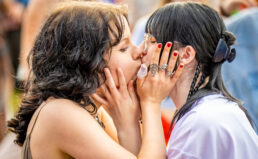Representatives of sexual minorities feel unsafe in Lithuania, because being a gay or lesbian in this country means living under continuous risk to your health and even life. This disturbing news reached the world yesterday when participants of the Annual Conference of the European Branch of the International Lesbian and Gay Association (ILGA) held in Vilnius, were victims of an impudent attack. On Friday night a gas propellant was thrown into the “Soho” Night Club of the Capital where participants of the Conference were enjoying themselves.
“These were terrible moments”, said one of the Conference participants. “We had no air to breathe and were afraid to go outdoors.”
The BBC reported on this incident yesterday reminding viewers that the Administration of Vilnius City prohibits gays from unfurling their banner in Rotušė Square. Unpleasant events were awaiting the Conference participants the following day too — at the entrance to the hotel they were met by a group of protestors. At the same time another international conference “Open your workplace” was held in the Capital to encourage employers’ tolerance towards homosexuals. The survey conducted by scientists of the Social Research Centre of Vilnius Vytauas Magnus University was introduced during this conference. The aim of this survey was to find out the attitude of people towards homosexuals. Incidentally, more than half the respondents who were asked to explain their attitude refused to participate in the survey. Respondents also included 25 gays, 10 lesbians, 2 bisexuals and 1 transsexual.
* * *
– Have you ever heard the opinion of some Lithuanian people that nobody harms homosexuals and they only complain in order to get financing from different funds? — asked “Lietuvos rytas” Jolanta Reingardė, Dr. of social sciences and one of the authors of this survey.
– This may appear to be the case at first sight. Even homosexuals themselves have been affected by such attitudes. They often say that they are not discriminated against at work because the matter of sexual orientation is not discussed at the workplace. But we as scientists have our own understanding of discrimination and we tried to find out what homosexuals think about it from their experiences. One lesbian interviewed by us said that she feels like a dissident in soviet society — she always has it in her mind that she will be repressed if her identity is disclosed.
– Did your survey reveal that Lithuania is a homophobic country?
– Yes! One third of Lithuanian residents said that they would refuse to associate with their neighbours should they find out that they are gay or lesbian. One fifth of the respondents would discontinue their relationship — even with a good friend — having discovered that he is homosexual. 18% would break off relations with a homosexual colleague, and 43% of people are of the opinion that homosexuals need medical treatment! However, the World Health Organisation deleted homosexuality from its list of health disorders three decades ago.
– What do residents of other European countries think about homosexuality?
– This question is excluded from Western surveys. In Scandinavia public disclosure of such points of view would be considered very inappropriate, let alone disclosure by politicians, who daren’t pronounce such words aloud. While in Lithuania if such a statement was made by a politician it would be considered a sign of a reasoned approach. In our country the use of such terms as “perversion”, “deviation”, and “sickness” when speaking about homosexuals is the general trend, because politicians expect this to help them win over the electorate.
– Is there any link between the patriarchate prevailing in Lithuania and homophobia?
– The more a person supports the opinion that the female’s duty is raising children and the male’s — working and earning money, the more homophobic their attitude. However, the attitudes of people who know homosexuals and those who have never met them differ.
– What people in Lithuania are the most intolerant towards homosexuals?
– Previously people used to think that education reduces homophobia. But the most homophobic group in Lithuania is represented by men from smaller towns with university education. The higher the education of men — the less tolerant they are towards homosexuals; the higher the education of women — the stronger their tolerance towards people of non-traditional sexual orientation. The most homophobic age group comprises elderly people.
– What is the attitude towards people of non-traditional sexual orientation at school?
– This is a delicate question. School plays a role in the lives of the majority of respondents as it is attended by their children or close relatives. Therefore, they are very categorical and flat about this matter. 58% of Lithuanians would be afraid if their children were taught by a lesbian.
– Whose life in Lithuania is more difficult — gays or lesbians?
– In my opinion, in a patriarchal and homophobic country life is harder for a lesbian. Lesbians can face double discrimination — on the grounds of gender and sexual orientation, and later — on the grounds of age. Gays in our society have more opportunities.
– Homosexual men often engage in the entertainment business, while there is no information about lesbians involved in this area.
– Many lesbians raise children and live in marriages with their partners, but if these relationships become known, a lesbian may suffer more than any man. In such a case her family, children and work can suffer. Women have fewer opportunities in the labour market than men. Moreover, it is easier for women to disguise themselves, because society to a certain extent tolerates demonstrations of sexuality and intimacy between women. Being emotional, associating with another woman, and holding hands with her does not make you a lesbian, while any manifestation of male emotionality is considered homosexuality.
– Are there any occupations in Lithuania that would be permissible for a homosexual?
– According to the data of our survey these are professions usually chosen by women. Women, as a rule, are friendlier towards gays. Therefore, hairdressing or designer’s professions are more suitable for gays. Gays also work in sales departments, restaurants, cafés and hotel networks.
– Is it better for a homosexual person in Lithuania to work for an international company?
– Some of our respondents work for international companies. They mentioned more than once that if need be, their employers would protect them without any hesitation. International companies apply certain mechanisms for guaranteeing equal opportunities in the working environment making homosexuals feel better there.
– If life is so hard for gays and lesbians — how do they manage to survive?
– The most reasonable strategy for homosexuals is to disguise their sexual identity. However, one must admit that this is not without consequences. Disguising one’s identity and having no possibility to be oneself can result in dissatisfaction with work or personal relationships. It can also cause different phobias and give rise to thoughts about emigration or even suicide.
– Have you met any suspicious glances during this survey on homosexuals — as if you yourself were of a non-traditional sexual orientation?
– You can never be sure about your employers’ attitudes. Yet I haven’t heard such an opinion about myself. I work in the area of gender studies. My colleagues know that I am married and have two children.



